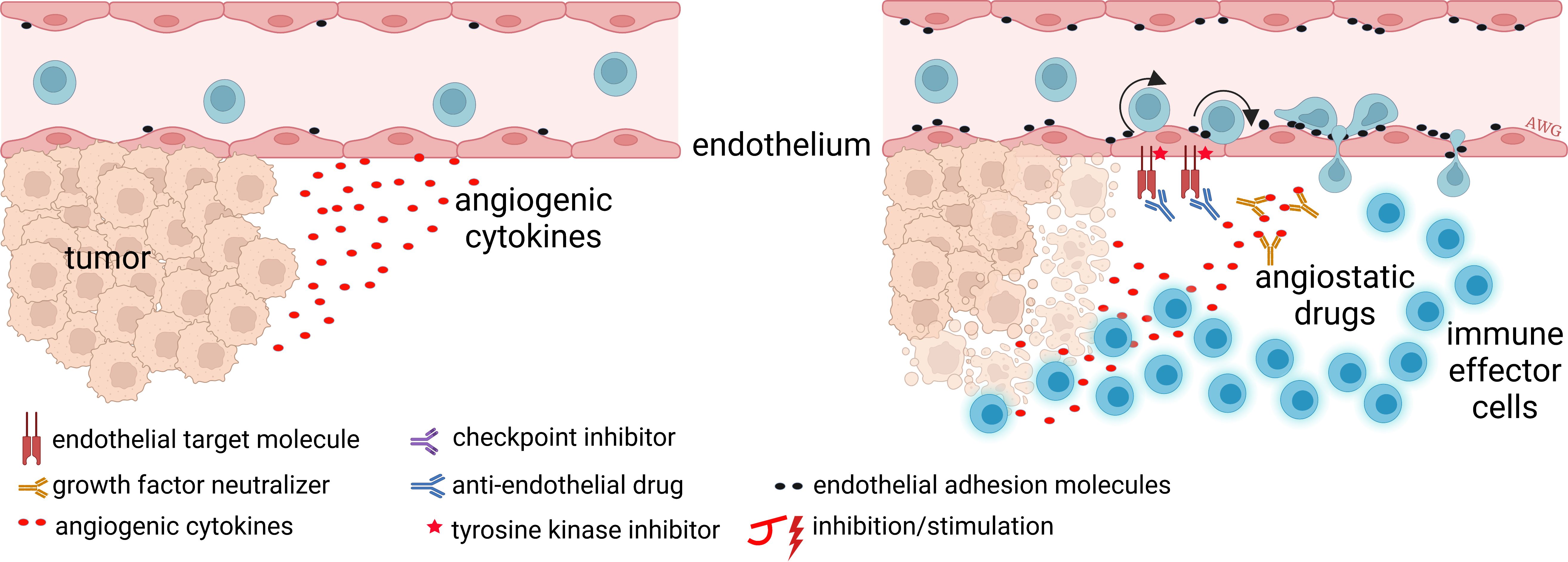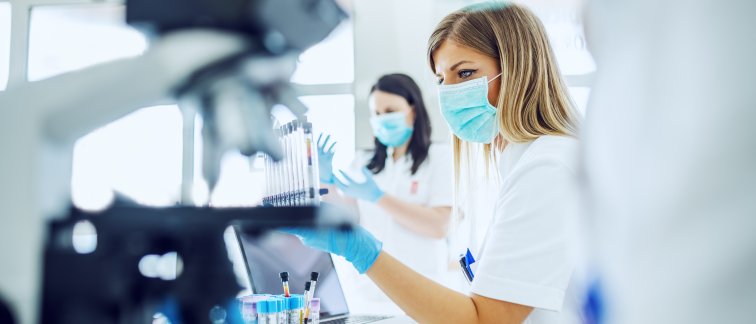Angiogenesis is the process of forming new blood vessels, which tumors use to grow and spread. However, angiogenesis associated with tumors also creates an environment that suppresses the immune response against the tumor. A study published in Angiogenesis by Prof. Arjan Griffioen and his research team found that treating patients with anti-angiogenic drugs can overcome this suppression by allowing immune cells to infiltrate the tumor more effectively.
Growth of blood vessels that are associated with tumors is a characteristic sign of cancer progression. Increasing evidence also demonstrates that tumor angiogenesis induces immune suppression and evasion of anti-tumor immune activity.
Previous preclinical studies showed that inhibition of angiogenesis can enhance immune response but the exact mechanism was unknown.
To gain more insight into how anti-angiogenic treatment improves anti-tumor immune activity, Prof. Arjan Griffioen and his team extensively profiled the immune infiltrate in tumors from renal cell carcinoma (RCC) patients that received angiogenesis inhibitors prior to surgery.
“Using preclinical models and RCC patient tumor tissues, we showed that angiogenesis inhibitors enhance immune activity by stimulating the entry and adhesion of leukocytes to tumor tissues,” says Prof. Griffioen. “Overcoming the tumor’s anti-immune activities – also called ‘tumor endothelial cell anergy’ – provides a rationale for the success of combination therapy that combines angiogenesis inhibitors and immunotherapy.”
 Left: Efficient tumor growth in immune-silent conditions induced by angiogenic cytokines. Right: Angiogenesis inhibitors allow invasion of immune effector cells.
Left: Efficient tumor growth in immune-silent conditions induced by angiogenic cytokines. Right: Angiogenesis inhibitors allow invasion of immune effector cells.
Currently, over 90 clinical trials are evaluating the clinical benefit of combining immunotherapy, in particular immune checkpoint inhibition, with anti-angiogenic agents. The results described in this study are the first to demonstrate in patients that the proinflammatory activity of anti-angiogenic drugs is based on overcoming tumor endothelial cell anergy. This supports the emerging concept that anti-angiogenic therapy can boost immunity, and elucidates the role of angiogenesis inhibitors in immunotherapy.
Prof. Griffioen: “The results of this paper urge for testing of more combination treatments of immunotherapy with angiogenesis inhibitors. Several studies with such combinations have already led to market approval by the FDA.”
Angiogenesis laboratory
Prof. Griffioen and his team of fifteen researchers aim to develop new treatment strategies against cancer based on targeting blood vessels in the tumor. The major research lines are centered around gene expression profiling of tumor endothelial cells and making vaccines against cancer, targeted towards tumor endothelial cell markers.
Prof. Griffioen: “Currently, we are working on a new vaccine that is ready for testing in patients, either as a monotherapy or in combination with immunotherapy, such as immune checkpoint inhibition. The most important question still outstanding according to Prof. Griffioen: “Does our vaccine also work in human patients?”.
Who is Prof. Griffioen?
Prof. dr. Arjan W. Griffioen studied medical biology at the Vrije Universiteit in Amsterdam and got his PhD in 1991 from the Utrecht University for his thesis on human B lymphocyte activation. In this year he also received his SMBWO-registration as immunologist. He performed his first postdoctoral research at the Academic Medical Center and at the University Medical Center Utrecht. In 1997 he was appointed at the Department of Internal Medicine of the University Hospital Maastricht. After a sabbatical leave to the University of Minnesota in Minneapolis in 2001, he was appointed at the Department of Pathology as Full Professor in Experimental Oncology and Angiogenesis at the University Hospital Maastricht. Prof. Griffioen is working as Professor of Experimental Oncology and Angiogenesis and Head of the Angiogenesis Laboratory at Amsterdam UMC since 2009. As of mid-2022 he also works parttime for the Amsterdam UMC spin-off company CimCure.
Prof. Griffioen has authored 281 peer-reviewed scientific publications (H-index 85) and joins the editorial board of several international scientific journals. He founded the Springer-Nature journal Angiogenesis (IF 10.658) in 1997 and is since then serving the journal as Editor-in-Chief. He is founder and Chief Scientific Officer of the biotech company CimCure BV. Also, he is director of the Graduate School Oncology Amsterdam (OOA) and from 2010-2022 he was director of the Master Oncology program at the Vrije Universiteit Amsterdam.
For more information, contact Arjan Griffioen or read the scientific publication.
Researchers involved at Amsterdam UMC:
Judy R van Beijnum, senior scientist at Angiogenesis Laboratory Amsterdam at Amsterdam UMC
Christian J Griffioen, Centre of Experimental and Molecular Medicine at Amsterdam UMC
Elisabeth J M Huijbers, postdoctoral researcher at Angiogenesis Laboratory Amsterdam at Amsterdam UMC
Victor L J L Thijssen, molecular cell biologist at Amsterdam UMC
Ekaterina S Jordanova, principal investigator at Amsterdam UMC
Tanja D de Gruijl, professor of Translational Tumor Immunology at Amsterdam UMC
Arjan W Griffioen, professor of Experimental Oncology at Amsterdam UMC and CSO of CimCure
Nowak-Sliwinska P., van Beijnum J. R., Griffioen C. J., Huinen Z. R., Sopesens N. G., Schulz R., Jenkins S. V., Dings R. P. M., Groenendijk F. H., Huijbers E. J. M., Thijssen V. L. J. L., Jonasch E., Vyth-Dreese F. A., Jordanova E. S., Bex A., Bernards R., de Gruijl T. D., & Griffioen A. W. (2022). Proinflammatory activity of VEGF-targeted treatment through reversal of tumor endothelial cell anergy. Angiogenesis. doi: 10.1007/s10456-022-09863-4. Epub ahead of print. PMID: 36459240.
Text: Esmée Vesseur

